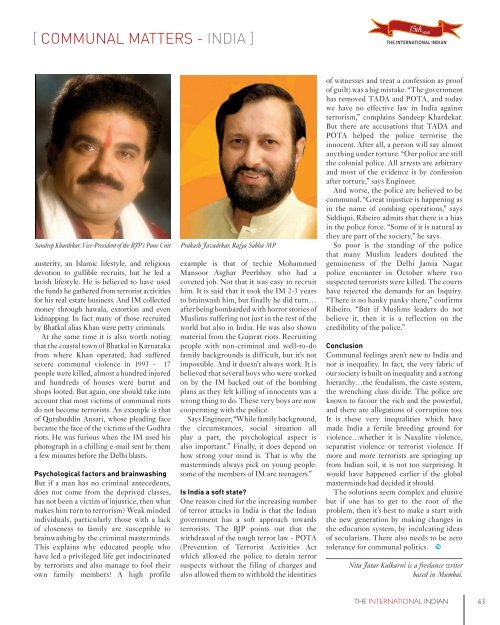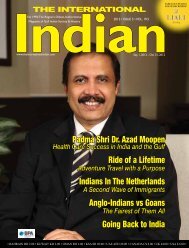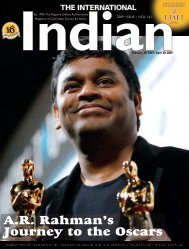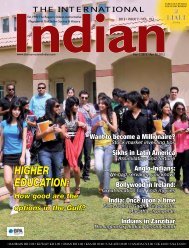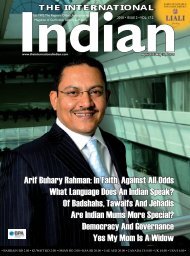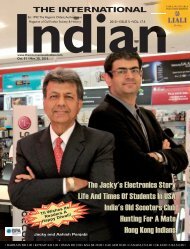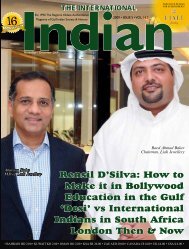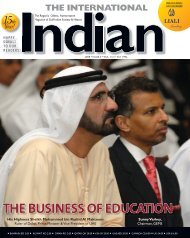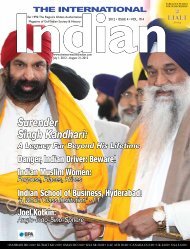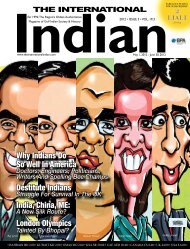THE INTERNATIONAL - International Indian
THE INTERNATIONAL - International Indian
THE INTERNATIONAL - International Indian
You also want an ePaper? Increase the reach of your titles
YUMPU automatically turns print PDFs into web optimized ePapers that Google loves.
[ COMMUNAL MATTERS - INDIA ]<br />
Sandeep Khardekar, Vice-President of the BJP’s Pune Unit<br />
austerity, an Islamic lifestyle, and religious<br />
devotion to gullible recruits, but he led a<br />
lavish lifestyle. He is believed to have used<br />
the funds he gathered from terrorist activities<br />
for his real estate business. And IM collected<br />
money through hawala, extortion and even<br />
kidnapping. In fact many of those recruited<br />
by Bhatkal alias Khan were petty criminals.<br />
At the same time it is also worth noting<br />
that the coastal town of Bhatkal in Karnataka<br />
from where Khan operated, had suffered<br />
severe communal violence in 1993 - 17<br />
people were killed, almost a hundred injured<br />
and hundreds of houses were burnt and<br />
shops looted. But again, one should take into<br />
account that most victims of communal riots<br />
do not become terrorists. An example is that<br />
of Qutubuddin Ansari, whose pleading face<br />
became the face of the victims of the Godhra<br />
riots. He was furious when the IM used his<br />
photograph in a chilling e-mail sent by them<br />
a few minutes before the Delhi blasts.<br />
Psychological factors and brainwashing<br />
But if a man has no criminal antecedents,<br />
does not come from the deprived classes,<br />
has not been a victim of injustice, then what<br />
makes him turn to terrorism? Weak minded<br />
individuals, particularly those with a lack<br />
of closeness to family are susceptible to<br />
brainwashing by the criminal masterminds.<br />
This explains why educated people who<br />
have led a privileged life get indoctrinated<br />
by terrorists and also manage to fool their<br />
own family members! A high profile<br />
Prakash Javadekar, Rajya Sabha MP<br />
example is that of techie Mohammed<br />
Mansoor Asghar Peerbhoy who had a<br />
coveted job. Not that it was easy to recruit<br />
him. It is said that it took the IM 2-3 years<br />
to brainwash him, but finally he did turn…<br />
after being bombarded with horror stories of<br />
Muslims suffering not just in the rest of the<br />
world but also in India. He was also shown<br />
material from the Gujarat riots. Recruiting<br />
people with non-criminal and well-to-do<br />
family backgrounds is difficult, but it’s not<br />
impossible. And it doesn’t always work. It is<br />
believed that several boys who were worked<br />
on by the IM backed out of the bombing<br />
plans as they felt killing of innocents was a<br />
wrong thing to do. These very boys are now<br />
cooperating with the police.<br />
Says Engineer, “While family background,<br />
the circumstances, social situation all<br />
play a part, the psychological aspect is<br />
also important.” Finally, it does depend on<br />
how strong your mind is. That is why the<br />
masterminds always pick on young people:<br />
some of the members of IM are teenagers.”<br />
Is India a soft state?<br />
One reason cited for the increasing number<br />
of terror attacks in India is that the <strong>Indian</strong><br />
government has a soft approach towards<br />
terrorists. The BJP points out that the<br />
withdrawal of the tough terror law - POTA<br />
(Prevention of Terrorist Activities Act<br />
which allowed the police to detain terror<br />
suspects without the filing of charges and<br />
also allowed them to withhold the identities<br />
of witnesses and treat a confession as proof<br />
of guilt) was a big mistake. “The government<br />
has removed TADA and POTA, and today<br />
we have no effective law in India against<br />
terrorism,” complains Sandeep Khardekar.<br />
But there are accusations that TADA and<br />
POTA helped the police terrorise the<br />
innocent. After all, a person will say almost<br />
anything under torture. “Our police are still<br />
the colonial police. All arrests are arbitrary<br />
and most of the evidence is by confession<br />
after torture,” says Engineer.<br />
And worse, the police are believed to be<br />
communal. “Great injustice is happening as<br />
in the name of combing operations,” says<br />
Siddiqui. Ribeiro admits that there is a bias<br />
in the police force. “Some of it is natural as<br />
they are part of the society,” he says.<br />
So poor is the standing of the police<br />
that many Muslim leaders doubted the<br />
genuineness of the Delhi Jamia Nagar<br />
police encounter in October where two<br />
suspected terrorists were killed. The courts<br />
have rejected the demands for an Inquiry.<br />
“There is no hanky panky there,” confirms<br />
Ribeiro. “But if Muslims leaders do not<br />
believe it, then it is a reflection on the<br />
credibility of the police.”<br />
Conclusion<br />
Communal feelings aren’t new to India and<br />
nor is inequality. In fact, the very fabric of<br />
our society is built on inequality and a strong<br />
hierarchy…the feudalism, the caste system,<br />
the wrenching class divide. The police are<br />
known to favour the rich and the powerful,<br />
and there are allegations of corruption too.<br />
It is these very inequalities which have<br />
made India a fertile breeding ground for<br />
violence…whether it is Naxalite violence,<br />
separatist violence or terrorist violence. If<br />
more and more terrorists are springing up<br />
from <strong>Indian</strong> soil, it is not too surprising. It<br />
would have happened earlier if the global<br />
masterminds had decided it should.<br />
The solutions seem complex and elusive<br />
but if one has to get to the root of the<br />
problem, then it’s best to make a start with<br />
the new generation by making changes in<br />
the education system, by inculcating ideas<br />
of secularism. There also needs to be zero<br />
tolerance for communal politics.<br />
Nita Jatar Kulkarni is a freelance writer<br />
based in Mumbai.<br />
<strong>THE</strong> <strong>INTERNATIONAL</strong> INDIAN 63


